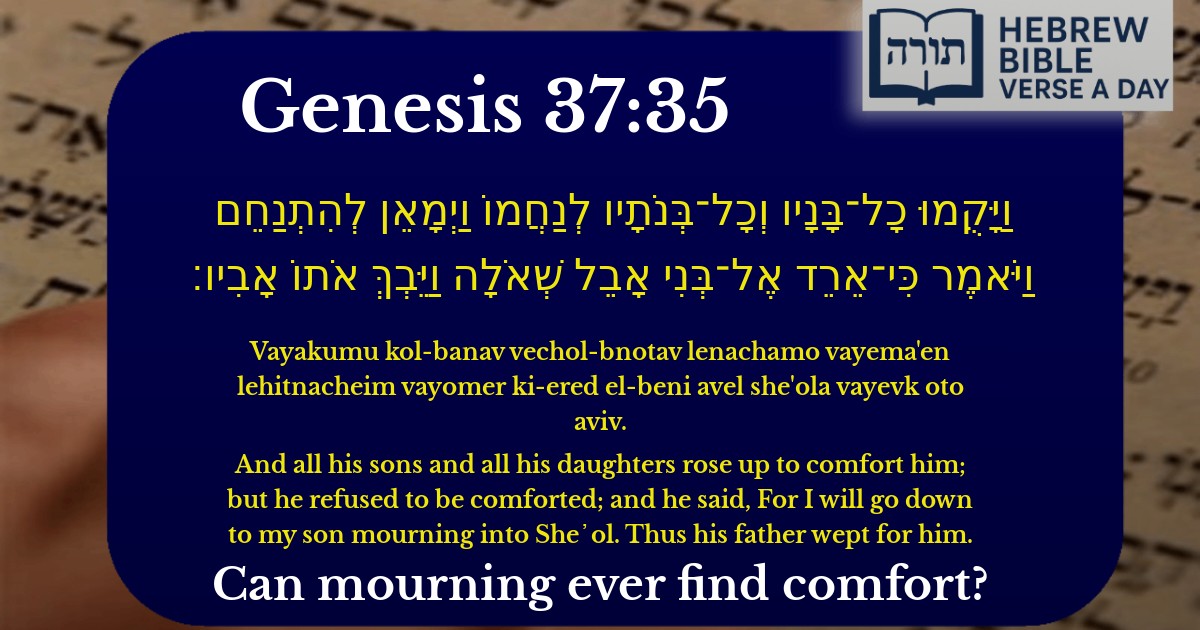Join Our Newsletter To Be Informed When New Videos Are Posted
Join the thousands of fellow Studends who rely on our videos to learn how to read the bible in Hebrew for free!
Hebrew Text
וַיָּקֻמוּ כָל־בָּנָיו וְכָל־בְּנֹתָיו לְנַחֲמוֹ וַיְמָאֵן לְהִתְנַחֵם וַיֹּאמֶר כִּי־אֵרֵד אֶל־בְּנִי אָבֵל שְׁאֹלָה וַיֵּבְךְּ אֹתוֹ אָבִיו׃
English Translation
And all his sons and all his daughters rose up to comfort him; but he refused to be comforted; and he said, For I will go down to my son mourning into She᾽ol. Thus his father wept for him.
Transliteration
Vayakumu kol-banav vechol-bnotav lenachamo vayema'en lehitnacheim vayomer ki-ered el-beni avel she'ola vayevk oto aviv.
Hebrew Leining Text
וַיָּקֻ֩מוּ֩ כׇל־בָּנָ֨יו וְכׇל־בְּנֹתָ֜יו לְנַחֲמ֗וֹ וַיְמָאֵן֙ לְהִתְנַחֵ֔ם וַיֹּ֕אמֶר כִּֽי־אֵרֵ֧ד אֶל־בְּנִ֛י אָבֵ֖ל שְׁאֹ֑לָה וַיֵּ֥בְךְּ אֹת֖וֹ אָבִֽיו׃
וַיָּקֻ֩מוּ֩ כׇל־בָּנָ֨יו וְכׇל־בְּנֹתָ֜יו לְנַחֲמ֗וֹ וַיְמָאֵן֙ לְהִתְנַחֵ֔ם וַיֹּ֕אמֶר כִּֽי־אֵרֵ֧ד אֶל־בְּנִ֛י אָבֵ֖ל שְׁאֹ֑לָה וַיֵּ֥בְךְּ אֹת֖וֹ אָבִֽיו׃
🎵 Listen to leining
Parasha Commentary
📚 Talmud Citations
This verse is quoted in the Talmud.
📖 Moed Katan 21b
The verse is referenced in the context of discussing mourning practices, illustrating how Jacob refused to be comforted after the loss of his son Joseph.


Context of the Verse
This verse (Genesis 37:35) describes Yaakov Avinu's reaction to the news of Yosef's apparent death. His children attempt to comfort him, but he refuses, expressing his intention to mourn until he joins Yosef in She'ol (the grave). This occurs after Yosef's brothers deceive Yaakov by presenting Yosef's bloodstained coat, leading him to believe Yosef was killed by a wild animal.
Yaakov's Refusal to be Comforted
Rashi explains that Yaakov could not accept consolation because Yosef was still alive (though Yaakov did not know this). The Gemara (Brachos 5b) teaches that one cannot be comforted for a living person mistakenly thought to be dead, as the Divine decree of mourning does not apply in such cases. Ramban adds that Yaakov's prophetic spirit sensed Yosef was alive, preventing him from accepting comfort.
The Term "She'ol"
Ibn Ezra interprets She'ol simply as the grave. However, Ramban suggests it refers to the afterlife realm where souls reside. This aligns with Kabbalistic understandings of She'ol as having different levels - the righteous experience it differently than the wicked.
Yaakov's Daughters
The mention of "all his daughters" raises questions, as the Torah previously mentions only one daughter, Dinah. Rashi explains this refers to his daughters-in-law, while Ibn Ezra suggests Yaakov had other unnamed daughters. The Midrash (Bereishis Rabbah 84:21) states these were twin sisters born with each son.
Psychological and Halachic Dimensions
Hidden Meaning in the Text
The Ba'al HaTurim finds significance in the word "אָבֵל" (mourning) having the same numerical value (34) as "בן" (son), hinting at the inseparable connection between Yaakov and Yosef. The Zohar sees deeper mystical meaning in Yaakov's descent into mourning foreshadowing the future exile and redemption of the Jewish people.